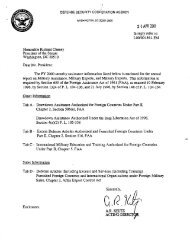memorandum of justification concerning human ... - Just the Facts
memorandum of justification concerning human ... - Just the Facts
memorandum of justification concerning human ... - Just the Facts
You also want an ePaper? Increase the reach of your titles
YUMPU automatically turns print PDFs into web optimized ePapers that Google loves.
UNCLASSIFIED<br />
- 72 -<br />
members 47 <strong>of</strong> indigenous communities marched from Popayán to Cali on October 12,<br />
2008, ultimately blocking <strong>the</strong> Pan-American Highway. The protestors demanded <strong>of</strong> <strong>the</strong><br />
Colombian government:<br />
A mutual agreement <strong>of</strong> respect on <strong>human</strong> rights;<br />
The naming <strong>of</strong> a follow-up commission to follow all agreed pacts between<br />
<strong>the</strong> government and indigenous groups;<br />
That President Uribe attend <strong>the</strong> next Community Council Meeting <strong>of</strong><br />
Indigenous Communities;<br />
That <strong>the</strong> Armed Forces leave Maria Piendamó;<br />
Fulfillment <strong>of</strong> <strong>the</strong> Nile Agreement and Decree 982; and<br />
Agreement from <strong>the</strong> Ombudsman‘s Office to verify constitutional vetoes<br />
regarding <strong>the</strong> acquisition <strong>of</strong> land.<br />
The groups held similar protests in 1999, causing widespread economic loss in <strong>the</strong><br />
region as goods could not be transported along <strong>the</strong> highway. President Uribe made clear<br />
in this most recent protest that, while he respected <strong>the</strong>ir right to protest, <strong>the</strong>y could not<br />
block <strong>the</strong> Pan-American Highway, as o<strong>the</strong>r citizens had a right to use <strong>the</strong> road. Saying<br />
―dialogue yes, violence no,‖ Uribe committed <strong>the</strong> government to meeting with <strong>the</strong> groups<br />
to discuss <strong>the</strong>ir demands. The MOI&J convoked <strong>the</strong> members <strong>of</strong> <strong>the</strong> commission that<br />
were involved in <strong>the</strong> Nilo Agreement, and sent representatives to <strong>the</strong> area on October 16,<br />
2008, to meet with indigenous leaders.<br />
On October 14, 2008, <strong>the</strong> National Police‘s Mobile Anti-Disturbance Squadrons<br />
(ESMAD - riot police) had several confrontations with protestors. The protests became<br />
violent. Protestors wielded machetes and used improvised explosive devices (IEDs)<br />
against government security forces that attempted to clear <strong>the</strong> roadways. Several<br />
protestors were injured, and two were killed. NGOs and indigenous groups say <strong>the</strong><br />
injuries and deaths were caused by ESMAD. The Colombian government maintains that<br />
ESMAD responded properly, using fire hoses and rubber bullets in its defense, and that<br />
<strong>the</strong> two deaths were caused by an IED deployed by <strong>the</strong> protestors. The Colombian<br />
government agreed to make reparations if security forces were found responsible for<br />
deaths during <strong>the</strong> protests. Several members <strong>of</strong> Colombia‘s security forces were also<br />
injured when indigenous groups lobbed IEDs at <strong>the</strong>m.<br />
On November 2, 2008, representatives from <strong>the</strong>se groups met with President Uribe<br />
to discuss <strong>the</strong>ir demands, though <strong>the</strong> dialogue yielded only limited results. The group<br />
marched again, this time from Cali to Bogotá on November 4, 2008. On November 20,<br />
47 Accounts vary.<br />
UNCLASSIFIED



